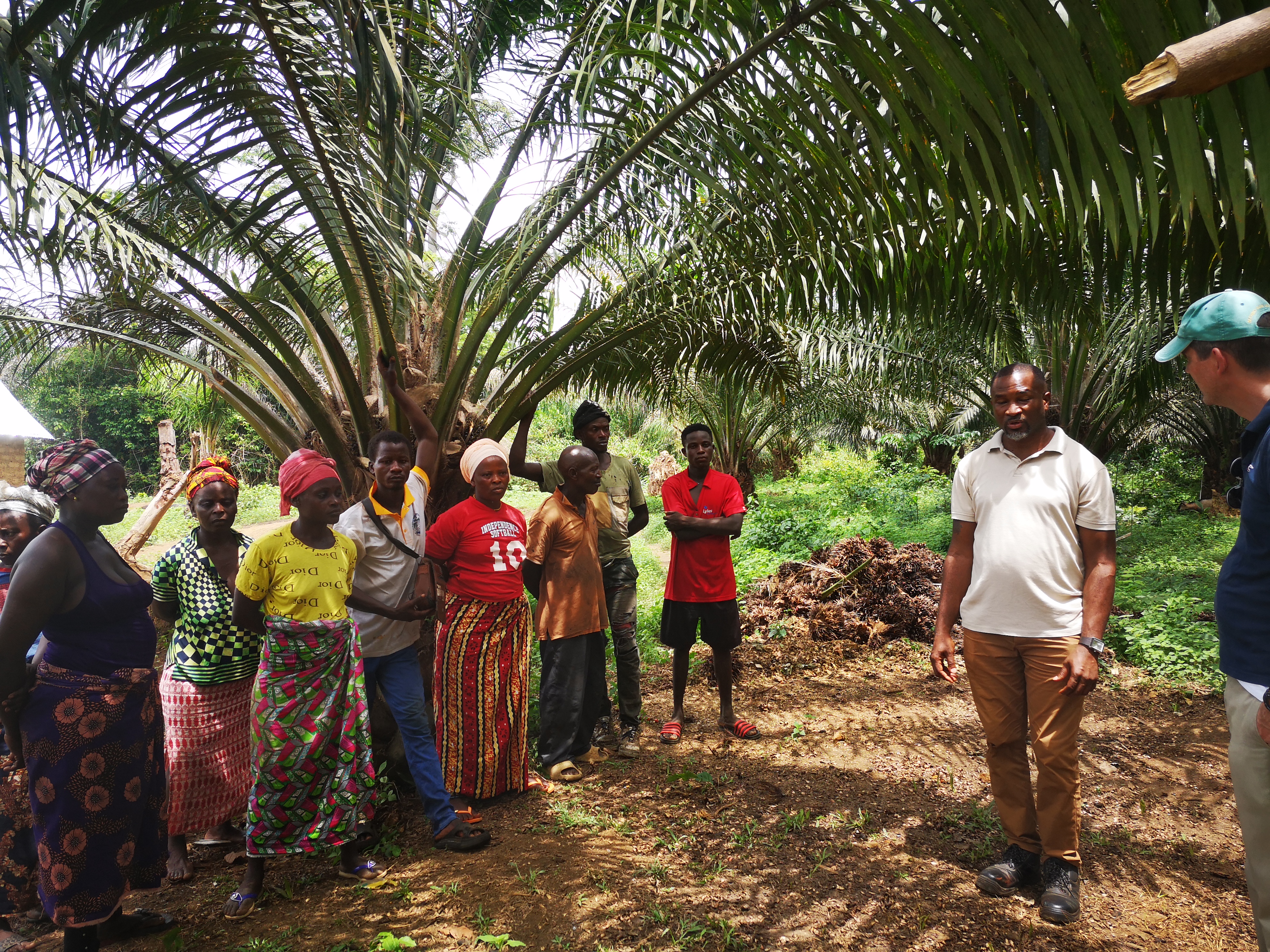Rebuilding communities in Sierra Leone by supporting organic palm oil
The Kailahun District of Sierra Leone was devastated during the country’s civil war which raged from 1991 to 2002. Thousands of lives were lost, millions were displaced, and the economy was crippled, intensifying poverty particularly among rural communities.
One victim of the violence was a palm oil facility in the town of Daru, destroyed in fighting around a miliary base on the opposite side of the Moa River. It was disastrous for local smallholder farmers, but the area’s fortunes have finally turned a corner. On the same ground, palm oil processing company Goldtree is playing a key role in resurrecting the sector and providing much-needed economic opportunity.
In 2012 the company built a new processing hub where the old one once stood and it is now working with around 8,000 farmers to supply organically grown palm fruit, which it transforms into organic-certified palm oil for export. In 2023 the CFC set up a USD 1 million trade finance facility to support this work.
In a region that still suffers from around 40% unemployment, the hub is an economic lifeline and Goldtree is determined to improve the lives of its smallholder suppliers says Jan Hein De Vroe, Founder and CEO of Planting Naturals, the Netherlands-based organic palm oil specialist that has run Goldtree since 2014.
“Organic palm oil is our reason for being and it allows us to pay a premium to the smallholders we collect it from,” says Jan. One of the advantages of palm oil, he explains, is the fact it can be harvested all year around every two weeks, which means it provides a continuous stable income.

Alongside the certainty of the palm harvest, farmers benefit from the comprehensive support Goldtree offers, including training to achieve regulatory standards such as EU organic and Roundtable on Sustainable Palm Oil (RSPO) certification. The business has also mapped all its farmer suppliers using precise polygon-mapping techniques to ensure they comply with the EU Deforestation Regulation. Together these activities enable smallholders to access more profitable international markets, lifting the value of their crop.
“The premium we pay varies depending on the time of year,” says Jan. “In peak season it can reach 100%, compared to what they’d get selling to a middleman. Whereas in the lean season, the price may be similar, but as independent smallholders they are free to sell to anybody.”
Equally as important as paying a premium is productivity, which Goldtree enhances by supplying high quality seeds that lead to greater yields. Lucas Vreuls, Managing Director at Planting Naturals, says: “One of the best ways to impact smallholder lives is growing better yielding trees. A lot of them have 40-year-old trees yielding very little oil. We help them plant and grow trees that can produce five to seven times more.”
To do this even more efficiently Goldtree encourages farmers to organise themselves into groups. “Where there is interest, community leaders identify spare land and we provide seeds. Local smallholders can then share the burden of farming and the income it generates.”
A small percentage of revenues is set aside for communities to allocate to building infrastructure, buying equipment or embarking on other improvement activities. It’s a way of working that “communities really appreciate”, says Lucas. And that positivity is reflected by the smallholders who work with Goldtree.
CFC Impact Investment Manager Peter Nielsen recently visited the area to meet some of them. A spokesperson for community members who collectively manage a group farm close to Daru, told him: “The group farm is a life changer for us. The plantation provides a steady income, which supports our children through school and helps us buy food. That’s why we’re focussing our attention on the group farm.”
A farmer from a different group in the same area added: “We put aside money each year to support people and develop the community. We decide as a group how the funds will be used.” Like most of the farmers that supply Goldtree, they grow other crops such as cassava, yam and maize, but it is palm that they now value the most. “Palm unifies us. It is so precious, it looks after our kids. We rely on it.”

“In an area that still has many challengers it’s clear that Goldtree is making a real difference to the lives of smallholders,” says Peter. And with major companies such as Cadbury and Nestle eager to ensure their palm oil comes from organic and deforestation-free sources, the demand for Goldtree’s product is only likely to grow.
“Our food system needs to be restructured to accommodate a growing global population while preserving and enhancing the ecosystems which the same food system relies on,” adds Peter. “We believe that Goldtree and its organic and deforestation-free palm oil offers a model for such a restructuring while providing valuable income opportunities for smallholders and rural populations in Sierra Leone in the process.”
The CFC’s funding will help Goldtree to take advantage of an expanding market and increase its impact on smallholder farmers. “These funds will finance our supply chain. So rather than waiting for our customers to pay for their oil before we can buy more fruit from farmers, we can continually invest in smallholders and their communities,” says Lucas.
As in all areas blighted by war, investment and economic opportunity can augment Sierra Leone’s recovery. In Daru, Goldtree is contributing to this brighter future, on the banks of the Moa River where conflict once caused such destruction.

